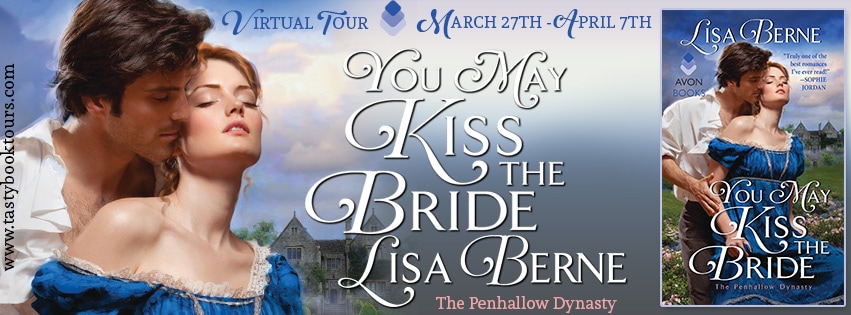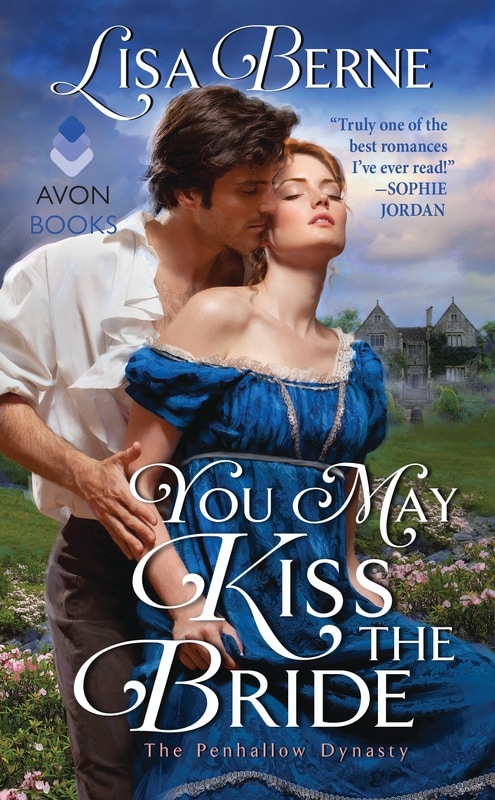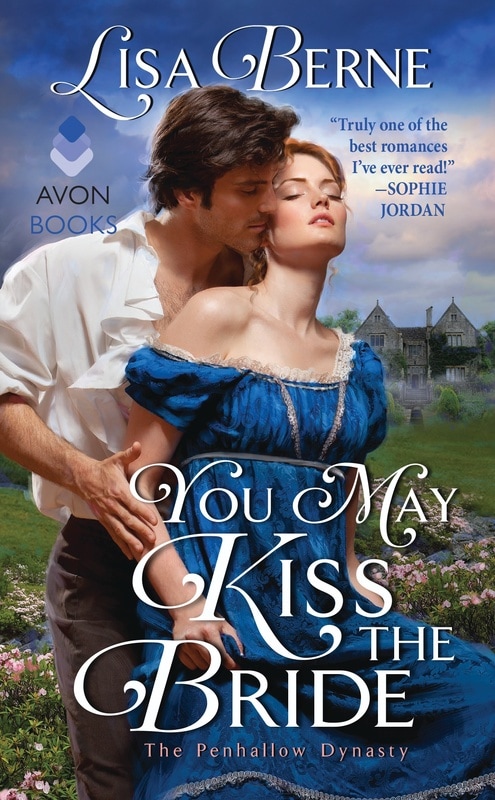|
You May Kiss the Bride The Penhallow Dynasty #1 By: Lisa Berne Releasing March 28, 2017 Avon 
In an unforgettable debut, Lisa Berne introduces you to the Penhallow Dynasty—men destined to marry, but hesitant to love.
Wealthy and arrogant, Gabriel Penhallow knows it’s time to fulfill his dynastic duty. All he must do is follow “The Penhallow way”—find a biddable bride, produce an heir and a spare, and then live separate lives. It’s worked so well for generations, certainly one kiss with the delectable Livia Stuart isn’t going to change things. Society dictates he marry her, and one chit is as good as another as long as she’s from a decent family. But Livia’s transformation from an original to a mundane diamond of the first water makes Gabriel realize he desperately wants the woman who somehow provoked him into that kiss. And for all the ladies who’ve thrown themselves at him, it’s the one who wants to flee whom he now wants. But how will he keep this independent miss from flying away?
This was dangerous. If she bit her lip any harder, thought Livia Stuart, it would probably begin to bleed, sending a bright red rivulet dripping down her chin, and end up staining—in a spectacularly uncouth way—the bodice of her gown.
The bodice of the gown which, Cecily had casually mentioned, was hers from two years ago. “And you’ve altered it so cleverly, I scarcely recognized it.” Cecily’s voice was soft and friendly, but in her pretty blue eyes there was, unmistakably, the gleam of cruel mischief. “I knew, of course, from the color, which is no longer quite in fashion.” Short of telling Cecily to stuff it, there didn’t really seem anything Livia could say, but she was spared the necessity of trying to think up something polite when Lady Glanville, Cecily’s mother, turned her gaze to Livia and subjected her person to a comprehensive scrutiny. “Indeed,” her ladyship finally said, with the gravity of one considering a matter of deep existential import. “That particular shade of rose was very popular. Princess Charlotte, I believe, favored it highly. I’m not at all certain, however, that it’s suitable for one of your coloring, Livia dear. It complements fair hair, such as Cecily’s, as well as a pale complexion, like hers. I’m sorry to say that you are rather brown.” “She would be out of doors so much,” Aunt Bella interpolated in her vague, melancholy way. “I’ve told her repeatedly how injurious it is to both health and appearance, but I do not think Livia attends to me.” She sighed gustily, sending the faded ribbons of her cap afluttering. “I do not think anyone attends to me. I do not think I am listened to by—” “Far be it from me to pontificate,” said Lady Glanville, “but one ought not to dwell on oneself, you know. We must always think of others. As Cecily does, for example. She could give her castoff gowns to her maids, as most other young ladies do, but instead she insists that dear little Livia have them. It’s quite touching, really.” “Your Uncle Charles doesn’t give you a dress allowance, does he, Livia?” Cecily’s tone was sympathetic. Too sympathetic. “But then, you don’t go anywhere, so perhaps it doesn’t matter a great deal.” “No,” Livia answered flatly. “No, it doesn’t matter at all.” Now it was Lady Glanville who audibly sighed as she glanced around the large drawingroom with its dated, shabby furniture, the wallpaper from a generation ago pockmarked with ghostly rectangles where valuable paintings had once hung but had since been sold. “It’s dreadfully lowering,” she said, “to see a gentleman’s family so reduced. Why, it was only ten years ago that we met nearly as equals.” Livia felt her teeth grit. She’d been forced to participate in these occasional morning visits from Cecily— the Honorable Miss Orr—and her mother—the Right Honorable Viscountess Glanville—for years. Because they were wealthy and highborn, apparently their arrogance and rudeness were to be endured. Livia clenched her hands tightly in the folds of her gown. Cecily’s gown. “Well, there’s no use in dwelling on what can’t be changed,” went on Lady Glanville. “I am afraid that life simply isn’t fair. A disagreeable fact, but what can one do? Now, do stop frowning, Livia dear, for I’m delighted to tell you we’ve come for the express purpose of offering a little treat.” “I’m all ears, ma’am,” replied Livia with what had to be obvious sarcasm, but Lady Glanville only said, with her arctic smile: “We are hosting a ball next week. It shall be a kind of début for Cecily. In addition—” “Mr. Gabriel Penhallow and his grandmother, Mrs. Penhallow, come to visit us!” Cecily said breathlessly. “The Penhallows! Of Surmont Hall! We met Mrs. Penhallow in Bath a few months ago. She wrote us a letter. He’s going to—” “My dear Cecily, pray refrain from interrupting. It is most unbecoming,” said her ladyship. “As you know, Bella, earlier in the summer I insisted that Lord Glanville go to Bath in order to drink from the waters. His gout, unfortunately, had been paining him a great deal. The nobleman’s affliction! And I thought Cecily might benefit from mixing in a wider society, for it is sadly limited in this neighborhood. There are, alas, so few families of our caliber. As both the daughter of an earl and as a viscountess, I fear I cannot but be aware of how limited our acquaintance must necessarily be. Yet one must, in these rackety modern times, sometimes unbend, and here we are.” “Too, too kind,” Aunt Bella murmured, evidently with real, if muzzy, gratitude. She took a sip from the delicate crystal glass on the little table at her elbow. In it was her cordial which, Livia knew, was heavily laced with laudanum. Lady Glanville nodded serenely, and the peacock feathers in her elaborate silk turban waved gently, as if in agreement. “While in Bath, we had occasion to observe Mrs. Penhallow in the Pump Room. I distinctly noticed her looking at Cecily but, naturally, would not have dreamed of encroaching upon her. An earl’s daughter is as nothing compared to her. The Penhallows came to England with the Conqueror, you know, and it’s said that the Conqueror bowed to them. Thus, imagine our gratification when she sent the Master of Ceremonies to us, so that he could escort us to her and perform the introduction.” “My knees were positively shaking!” Cecily put in. “But I curtsied quite well, didn’t I, Mama?” “Creditably so. I had no occasion to blush. I must plume myself on my foresight in having you practice curtsying before we left for Bath. An hour a day works wonders. But I digress. Mrs. Penhallow and I spoke for some fifteen minutes, and at the risk of seeming boastful I must say that she was condescension itself! We dis cussed the weather and the dreadful state of the roads. I happened to mention Lord Glanville’s gout, and she recommended a treatment which—” Her ladyship went on to recount further details of her conversation with the redoubtable Mrs. Penhallow, a personage of whom Livia knew nothing and cared less. Bored, she stopped listening and instead she looked at the rapt, lovely face of Cecily as she hung on her mother’s every word.
Describe yourself in five words or less. Curious, creative; reader, writer, dreamer. If you had a theme song, what would it be? “Gonna Fly Now” from Rocky. Because perseverance is an important quality for a writer. Name one thing you won’t leave home without. Besides the necessary cellphone, wallet, and lip gloss? A little notebook and pen. (I know you said one thing, but this is plainly a writer’s indivisible unit of oneness.) Inspiration can strike at any time, and for me paper’s better than apps for jotting down notes about my writing. Name three things on your desk right now. A thesaurus. A couple of houseplants, which I’m sneakily categorizing as “greenery,” because I also want to mention my stack of Post-it Notes, without which I am considerably less productive. What types of scenes are your most favorite to write? I love writing scenes in which characters are talking and there are all kinds of things they can’t — or won’t — say embedded within their words, whether it’s because they’re wrestling with their emotions, unaware of their deep true feelings, constricted by the etiquette of the time, other people are around, and so on. Which means that in what seems like a simple conversation, the subtext can be deliciously complicated. Do you have any advice to give to aspiring writers? I’m not the first to suggest that reading — widely and voraciously across multiple genres, both for pleasure and with an analytic eye — is a necessary component for someone wanting to become a writer. There are also a lot of great, insightful books and blogs on the subject; I particularly like Stephen King’s On Writing, Elizabeth Gilbert’s Big Magic, Gwen Hayes’ Romancing the Beat, and Chuck Wendig’s bracing, blisteringly unsentimental approach to the writing life. Can you tell us about your upcoming book? With pleasure! Coming this summer is the second book in the Penhallow Dynasty series: The Laird Takes a Bride, featuring Scotsman Alasdair Penhallow, who’s forced by an arcane decree to marry and ends up with spirited Fiona Douglass. They’re both very resentful of the situation, and don’t find each other particularly attractive or appealing . . . which is, of course, a highly inauspicious way to begin a marriage. But it’s a very fun way to set a love story in motion. 
Lisa Berne read her first Georgette Heyer book at fourteen, and was instantly captivated. Later, she was a graduate student, a grantwriter, and an investment banker, but is thrilled to be returning to her roots and writing her own historical-romance novels!
She lives with her family in the Pacific Northwest Author Links: WEBSITE | FACEBOOK | TWITTER | GOODREADS
1 Comment
Allisia with Tasty Book Tours
27/3/2017 18:27:16
Thank you for hosting!
Reply
Leave a Reply. |



















